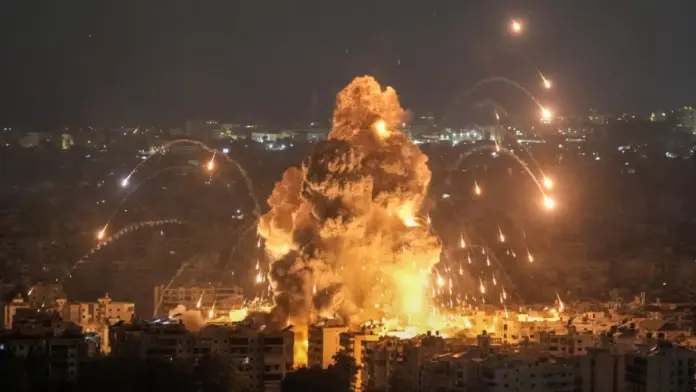Israel Strikes Iran: Middle East tensions have sharply increased after Israel preemptively attacked Iran’s nuclear program in an early morning surprise assault. Several of Tehran’s sensitive nuclear and missile-related sites were hit by the Israeli air raid, with a quick and angry response from Iranian leadership.
A senior Iranian security official said Tehran is mulling a “harsh and decisive” retaliation. “The response to the Israeli attack will be harsh and decisive,” the official stated. There are talks “at the highest levels” on the kind and timing of retaliation, the source added.
Israeli Strike Rattles Tehran
The Israeli strike was said to have brought major devastation to Iran’s nuclear facilities and missile plants. Smoke and flames were spotted from several buildings in Tehran, with initial photos depicting broken windows, burnt rooftops, and rescue units racing towards the locations.
The raid, while not formally attributed to the Israeli government upon reporting, is considered a premeditated attack designed to stifle Iran’s swiftly developing nuclear program. It comes as international alarm concerning Tehran’s uranium enrichment program increases, with Western nations maintaining that Tehran is on the cusp of weapons-grade uranium.
Also read: Air India Flight AI-171 Crash: 2025 Ahmedabad Tragedy After Takeoff
Tehran Rebuffs with Drone Launches
Within a matter of hours of the attack, Iran had sent more than 100 drones to Israel, as per Israeli military reports. The drone assault represents one of the most significant direct military escalations in recent years between the two countries.
No official casualty count has come out, but both countries are preparing for greater escalation. Air raid sirens sounded in various Israeli cities, and counter-defense systems were switched on to neutralize incoming threats.
Supreme Leader Said Alive During The Turmoil
During the turmoil, there were reports on the health of Iran’s Supreme Leader, Ayatollah Ali Khamenei. There were some unofficial social media reports indicating that he had been hurt during the attacks. Iranian officials, however, promptly dismissed the rumors.
A security official has told Reuters that Khamenei is alive and still keeping a close eye on the situation. His presence, even if by being indoors, is pivotal to sustaining the unity and stability within Iran’s political framework during this tumultuous time.
Oil Prices Surge Over 9%
Global markets acted quickly to the developing crisis. Crude oil prices jumped over 9% just hours after the news broke, showing investors’ concerns about possible disruptions in Middle East oil supply. The Strait of Hormuz, which carries one-fifth of all world oil, is suddenly in the news again.
Energy experts caution that an extended Israel-Iran conflict could seriously shake global energy equilibrium. The last time tensions came so close to boiling over, crude prices remained elevated for weeks, shocking inflation-prone economies.
Global Reactions Begin to Pour In
Governments around the globe are appealing for de-escalation. Officials from the European Union have called on Iran and Israel to remain restrained. The United Nations is convening an emergency Security Council meeting to consider the crisis as it is unfolding.
U.S. Secretary of State Antony Blinken is also set to meet both Israeli and Iranian leaders, but diplomatic achievement is not near at hand. Washington has long backed Israel’s right to self-defense but has also called for restraint in confronting Iranian nuclear aggression.
Russia and China, both close to Iran economically and diplomatically, denounced the Israeli attacks and demanded urgent negotiations. Moscow called the attack a “dangerous provocation” that might escalate into a broader regional war.
A Deepening Crisis
The confrontation is the most intense military clash between Israel and Iran in more than a decade. It is a turning point in their protracted shadow war, frequently waged by cyberattacks, assassinations, and proxy wars.
Israel has long threatened that it would not permit Iran to achieve nuclear capability, insisting that a nuclear-armed Tehran would be an existential threat. Iran, in turn, insists its nuclear program is for peaceful purposes of energy only, something few Western governments believe.
Also read: Sinkhole Discovered at McGhee Tyson Airport Road
Uncertain Days Ahead
And so the world waits and wonders, how far will this go?
Iran’s threat of a “harsh response” indicates that retaliation is not merely possible, but imminent. The drone attacks may be merely the opening salvo of a wider counterattack.
Both countries are at present on a course that threatens more general war. Diplomatic backchannels, if there are any, remain silent. Civilians in the region prepare themselves for more attacks, more sirens, and more destruction.
The world waits. Whatever Tehran and Jerusalem do next could determine not only their own future, but the future of stability throughout the Middle East.








